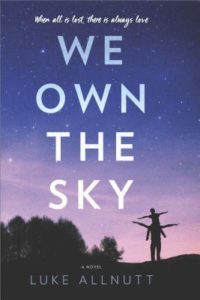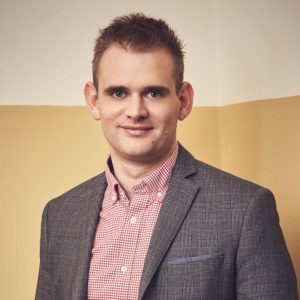 Title: We Own the Sky by Luke Allnut
Title: We Own the Sky by Luke Allnut
Publisher: Park Row
Genre: Contemporary, Women’s Fiction
Length: 368 pages
Summary:
We looked down at the cliff jutting into the sea, a rubber boat full of kids going under the arch, and then you started running and jumping through the grass, dodging the rabbit holes, shouting at the top of your voice, so I started chasing you, trying to catch you, and we were laughing so hard as we ran and ran, kicking up rainbow showers in the leaves.”
Rob Coates feels like he’s won the lottery of life. There is Anna, his incredible wife, their London town house and, most precious of all, Jack, their son, who makes every day an extraordinary adventure. But when a devastating illness befalls his family, Rob’s world begins to unravel. Suddenly finding himself alone, Rob seeks solace in photographing the skyscrapers and clifftops he and his son Jack used to visit. And just when it seems that all hope is lost, Rob embarks on the most unforgettable of journeys to find his way back to life, and forgiveness.
We Own the Sky is a tender, heartrending, but ultimately life-affirming novel that will resonate deeply with anyone who has suffered loss or experienced great love. With stunning eloquence and acumen, Luke Allnutt has penned a soaring debut and a true testament to the power of love, showing how even the most thoroughly broken heart can learn to beat again.
Add to Goodreads.
Purchase Links: Amazon * B&N * BAM!
Excerpt #15
CHAPTER THREE
A blue line. In the end that was all it was. I remember the doctor’s pause. I thought that the ultrasound monitor had frozen, because the little gray-white shadow wasn’t moving. I could feel Anna next to me, holding her breath, trying to decipher the shadows on the screen above her.
“Hmm, I’m afraid I’m not picking up a heartbeat, right now,” the doctor said, moving the wand across Anna’s belly. Where we had once seen a heartbeat, an electronic wobble, a quiver of white, now there was nothing.
She began to measure the size of the fetus. Has it grown, I said? It’s small, eight weeks, the doctor said, but Anna was ten weeks gone. So it’s small, I said, because I didn’t understand these things. He’s underweight?
Anna did understand these things. Without prompting, she wiped down her stomach with a piece of paper towel and sat up on the side of the bed, her eyes fixed on the monitor on the wall.
The second time Anna miscarried, it was at thirteen weeks.
“I’m sorry,” the doctor said, “We’re just not seeing growth we would have expected at this point.” This time, it wasn’t just a little cluster of amniotic cells, but it had a human form, with limbs, a heart, a mouth. The baby had eyelids. That child, which had to be evacuated from Anna’s body, could have been held in the palm of our hand. Even though we didn’t know the sex, Anna later told me she had named her Lucy.
Anna grieved silently. She didn’t tell her mother; she didn’t tell Lola, who wore her own miscarriage on her sleeve. Because that was Anna’s way, that was how she had been taught. Stoicism, above all.
Growing up in Kenya, a latch-key kid in a poor, dusty parish, the locals greeted her every morning on her walk to school with stones and insults, calling her a white devil and a smelly buffalo cunt. When Anna told her parents, they said she was complaining, spoiled, was not prepared to suffer for the Lord.
We kept things to ourselves. Our lost babies were our secrets. They bound us together. Yes, those secrets were devastating, but they were ours and ours alone.
She told me everything, even the feelings she said were shameful. She thought she was being punished, but she could not say for what. She said she could not bear to go to the supermarket and see young moms because she thought they had taken her babies away. She said she did not believe there was anything wrong with her eggs, the fetus we had created together, but the fault was in her ability to carry the child. She thought she was damaged, that her body had a mechanical defect. Mis-carriage. I had never thought of it that way, the carriage part.
Anna, however, wasn’t to be deterred. She applied herself to having a baby in the way she had got her first-class honors. We went to see specialists on Harley Street and they ran tests, tests galore, but they found nothing wrong with her. Just one of those things, better luck next time.
So we kept on trying, refused to give up, because that was how Anna saw the world: as a fight, your guard up, backs against the wall. It was where we converged. The kid from an Essex public housing and the scholarship girl, who both felt like we had something to prove, because we didn’t have rich parents or a proud lineage.
At Anna’s suggestion, I went to a clinic and, in a toilet stall with a handrail and an emergency cord, jerked off over some ancient pornography. But there was nothing wrong with my sperm. Top notch, the doctor said. Pristine.
We were not surprised when Anna got pregnant for the third time, because conceiving had never been the problem. We approached the pregnancy with a sense of fatalism. At around the eight-week mark, we expected the same: Anna’s strange cramps, the feeling she described as an emptiness, even though both times the child had been there, living and dying inside her. But, no, there it was on the monitor: a heartbeat. And not just any heartbeat, but a strong heartbeat. There were hands and feet, the delicate outline of ribs. There were eyes, a half-formed pancreas. There were eyelids.
In the second trimester, they told us that the chances of losing the baby, even for a high-risk pregnancy, were slim. We didn’t believe them. It was inappropriate, I said to Anna, but it felt like we were on Who Wants to Be a Millionaire?, where the questions were getting harder and we were pushing our luck by staying in the game.
“Your analogy doesn’t work,” Anna said, “because we can’t cash out. If you could cash out with a baby, it would work.”
It was at the start of Anna’s third trimester when I noticed them. I was in the backyard one day, and there were two sunflowers that hadn’t been there before. Anna hated gardening. It was a chore, she said, and she had never planted anything in her life.
I went into the kitchen and she was standing at the sink, in her apron, washing some coffee cups.
“I like your sunflowers,” I said. “Did you do that?”
“I did,” she said, looking pleased with herself. “They’re nice, aren’t they?”
“They are. I’m just surprised. I thought you hated gardening.”
“Oh, I do, don’t worry about that… It’s just…” She swallowed and put down a coffee mug. “You’ll think me silly, but I just wanted to do something. You know, for the little ones. I know that’s not the sort of thing I do, but I thought it would be nice.” Then she turned away from me, because she didn’t want me to see her cry, and I put my arms around her, and she buried her head into my neck.
“The woman in the garden center said they were robust, good in all weathers.”
Author Bio

Giveaway
I am giving ONE PRINT copy of We Own the Sky (contest open to US Addresses ONLY). To enter the giveaway, please fill out the form below by 5 PM Mountain Time Friday March 6th:
CONTEST OVER
Please Note: The prize will be mailed by the author and/or publisher.
Follow the rest of the tour HERE.


Thanks for featuring this excerpt for the tour!